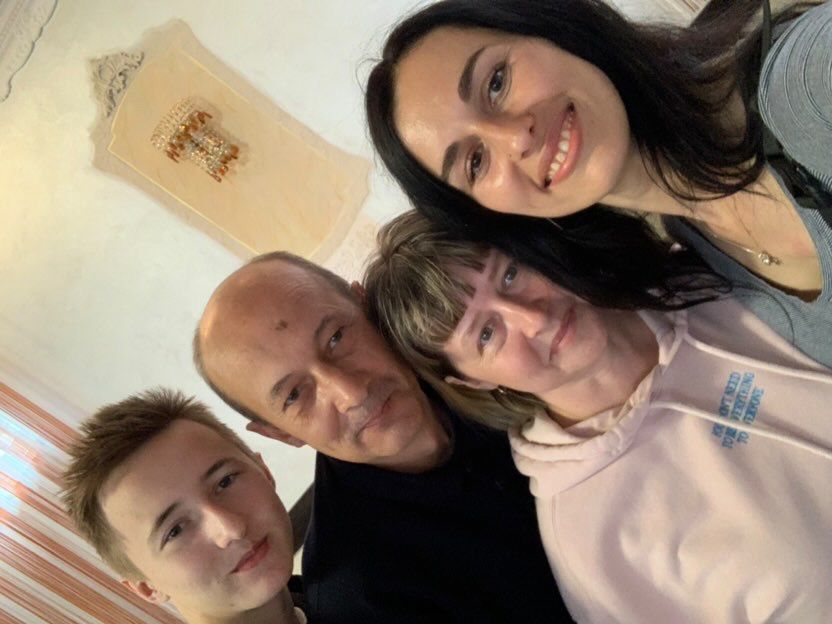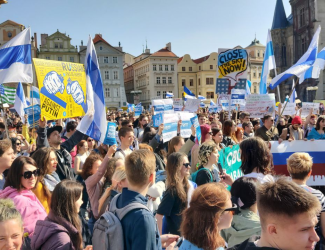A few weeks ago, we introduced you to Dasha Andrienko, who once lived in Wayne, Pa. and is now working help rescue refugees in Ukraine. Like millions of other Ukrainians, she fled her home with all that she could carry, a small backpack, and boarded a train to West Ukraine, where she decided to stay and volunteer. This is the second podcast by Loquitur Media reporter Lashay Smith.
Below is the first of more stories reflecting voices from Ukraine. The Loquitur plans to continue the conversation with Dasha and others working to rescue people from the war.
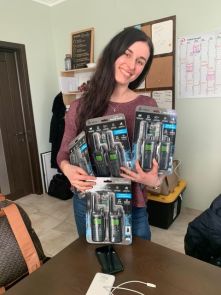
Nearly a month ago, Dasha Andrienko awoke at 5 a.m. to what sounded like “fireworks.”
She glanced out the window of her apartment in Kharkiv, Ukraine and saw the smokey and fiery aftermath of the first attack on her home city and quickly sent a text message to her family, friends and neighbors.
“Everybody was like, ‘Hey, it’s the war,’ ” Andrienko said. “It started.”
Andrienko, once a resident of Wayne, Pa., is among millions of Ukrainians who fled their homes in the aftermath of the Russian invasion. As of Friday, March 18, at least 6,000 lives have been lost and 4 million people displaced. Many have left the country. Andrienko had her chance to leave, but she decided to stay and help her people.
In a March 16 Zoom interview with Cabrini University’s student media, The Loquitur, she described her journey and the struggle to leave home. From a base in west Ukraine, she recalled her first reaction when the bombs started to fall, quickly scanning her apartment to decide what to take and what to leave behind. It was a moment that reminded her that “everything is temporary.”
“A challenge was to leave with one backpack, not knowing if you will be able to come home again,” she said.
Andrienko packed documents, an emergency bag. Then, she turned on the news to see other cities being bombed.
“Like never before, you understand that all material is temporary and what really matters (are the) lives of people,” she said. “I had to learn not to be attached to material things, and not think of my green plants at home for example, that I love a lot…that are so unimportant on the scale of everything,”
After her messages between loved ones, Andrienko immediately looked to God. She prayed about the forthcoming hardship her and the citizens of Ukraine would have to face.
“I didn’t panic because I knew I had this deep assurance that my life was in God’s hand, but I needed to do something,” Andrienko said. “…Emotions become numb in times like these.”
Seven days in a bomb shelter
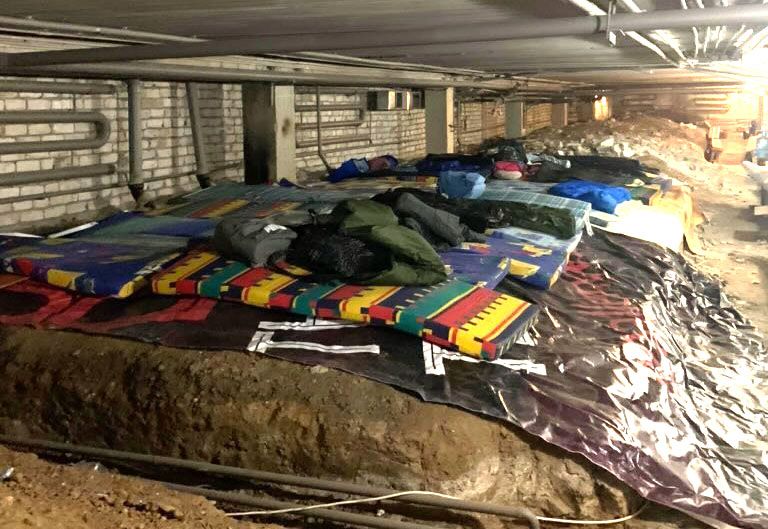
Soon after she left her apartment, she went to her church to help to prepare the building for people taking shelter. Below the church was a “bomb shelter,” where they spread mattresses on a dirt floor, creating a place where she and others stayed for the next seven days. Some were friends and neighbors. Others were strangers who she quickly bonded with.
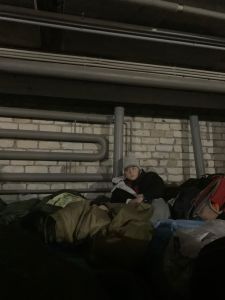
“I shared a mattress with a girl I had just met,” Andrienko said, mentioning that others thought they were lifelong friends.
About 80 to 100 people stayed in the church, she said.
However, Andrienko’s family wasn’t among them. Her family lived a half hour away and without a car, and it wasn’t safe to walk. At first, it was better for them to stay home and only go out for supplies like food and drinking water.
“My mom had back problems, so they weren’t sure whether they should go,” she said. “But we stayed in touch all the time, asking ‘how are you?’ and ‘is everything fine?’ At that time, she said, and it was almost impossible to get a Taxi. You didn’t know where the shooting or the bombing was going to go.”
In the church, emergency alarms set up by a former member of the military alerted her and others to incoming attacks, and they moved downstairs for safety when they heard the sirens. Through all of that, the hope in God kept them all together, she said.
“Praise God that nobody panicked,” Andrienko said. “We sang worship, we prayed and we read the Bible.”
Despite the building shaking as the rockets landed close by, the group huddled on mattresses guided by the Psalms that they read, Andrienko said. They sang gospel music, as a man with a guitar played. Her faith in God, she said, helped her through the toughest moments and those uncertain hours when the bombs struck near them.

“(We were) going up and down when it was getting loud and when the bombing was close,” Andrienko said.
As the attacks intensified, Andrienko and others living in the church decided to journey to west Ukraine to find a better place “because it was not getting better at all.” But the most dangerous journey, she said, was traveling from homes or bomb shelters to the train station, where thousands packed trains with standing-room only.
She said they stayed calm by reminding themselves that trust in God would get them through it.
The day after they left for the train station to head west, the church was bombed. Since it was evacuated, no one was hurt.
At the station, Andrienko said the platform was filled with families. People packed into the train for a 15 hour ride. People had to take turns sitting on the floor while the majority stood.
The train arrived at a base in West Ukraine. Volunteers, including Andrienko, work to find ways to get people evacuated out of Kyiv, Ukraine’s capital, and out of the country by bus.
“I see everyday and I hear on the phone, the stories of people escaping or their house being totally destroyed.” Andrienko said.
She described the crying children as their father’s placed them on buses because they don’t know when they’ll see each other again. For Andrienko, she was able to see her parents again. She feared for the risk they took to get to the train.
She said it’s unknown when the bombing and shooting will start, and boarding the train can be just as life threatening. A few days before her parents arrived, someone had been shot and killed at the station in an attempt to help people board the train.
“I was really praying for safety and God’s protection when my parents were taking a taxi cab to the train station because you don’t know whenever it can start and whenever it can happen,” Andrienko said.
An outpouring of support
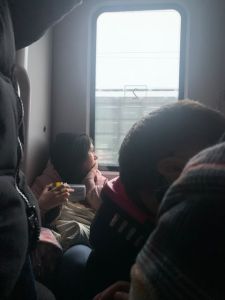
During her time in the church and on the train, friends from across the globe reached out through social media to offer support and prayers.
She had the opportunity to leave, to either head to Canada where her boyfriend lives or go stay in Germany, where a friend’s family lives. People from across the Philadelphia region offered support. A few years ago, Andrienko was an Au Pair, living in Wayne, Pennsylvania between 2016 and 2017.
Jana Wickenkamp, a senior international business major at Cabrini, was among her friends offering Andrienko a place to stay her family’s home in Germany.
“I’ve been so worried, and reached out to see how she was doing,” Wickenkamp said, who learned Ukrainians are looking to gather walkie-talkies, bedding and food. “Right now, she’s helping people rest until they can get to a new place. She’s always been very involved in her community.”
“I asked her if she needed a place to stay,” Wickenkamp said. “But she said her friend wants to be there to ‘help her community.'”
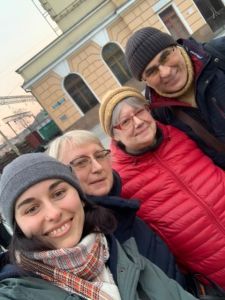
Today, Andrienko is fighting to safeguard herself, her family and thousands of refugees who are making their way through a “transit stop” in western Ukraine seeking a way out of danger.
From the new location, which for safety reasons she did not want to disclose, she now helps to keep refugees safe until they are able to move out of the country.
She said, “It’s like a transit center. We host people on YWAM base to get rest and food for a couple nights, and from here they can move further.”
From the rescue mission, Andrienko – speaking a Zoom interview with Cabrini University’s student media, The Loquitur – welcomed the chance to share her story and the importance of the YMAM Slavic Ministries, which is gathering materials to safeguard those who are trying to escape the war.
While in the early days, the trains were packed with people trying to escape, the situation has changed. Many people – especially the older population or those with disabilities – don’t have cars and fear leaving their homes.
The fear of being hit by a stray bullet, or becoming the main target, is what’s keeping the people of Ukraine from deciding if they want to leave, she said. She said making that decision is very dangerous, and people risk their lives day to day to get to a destination that will keep them safe and protected.
Andrienko said many young men are braving long journeys, driving vans and buses beyond the frontline to get people out.
She said the war is bringing the community together, and their faith is allowing them to take risks and protect the ones that they love.
Although Russians and Ukrainians share similar aspects of culture, Andrienko mentioned the moral aspects that separate the two nations.
“In the course of history right now, you can see the big difference of the spirit of Ukrainians, who always wanted to be a free nation, who always wanted to live independently, while Russians, who are afraid to speak their minds, who are afraid to post on social media because they have a dictator,” Andrienko said. Ukrainians, in a country that embraces independence, “are willing to lay their lives on the line for the freedom of their country, for the future and not stay silent,” Andrienko said.
Ukrainians, she said, are blocking tanks and stopping men armed with guns “with their bare hands.”
Losing track of time
Amid the chaos, she said, “I don’t even remember the dates anymore. The days of the week.”
Just a month ago, she said, “Everybody thought it would (be) absolute crazy to actually start the war with all the sanctions that Russia would get.”
Andrienko feels blessed that her friends and connections in Wayne and in the Cabrini area have reached out.
“I have a lot of close friends in Wayne and Phoenixville who reached out and are praying and staying in touch. Some sent donations for my personal needs and others sent donations for the mission, so I feel cared for and loved.”
While she wishes to eventually head to Canada, she is committed to her mission at home, assisting the people of her nation. “I could fly out there right away, but I didn’t want to leave Ukraine without doing anything.”
“We all have a role to play – every one of us.”
When asked what those at Cabrini can offer, she said, “Prayers. We need prayers.”
|
Forty five years ago, the world was a very different place. Eastern Europe, dominated by the Soviet Union was barricaded by something called “The Iron Curtain.”
www.ywamslavicministries.org
|

